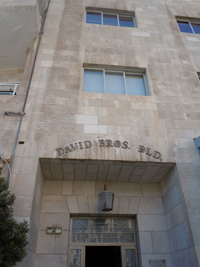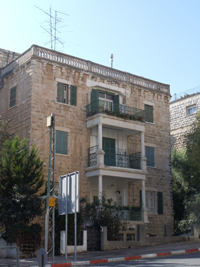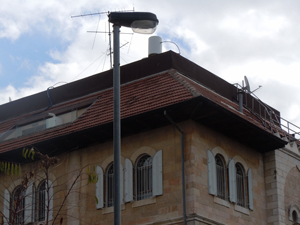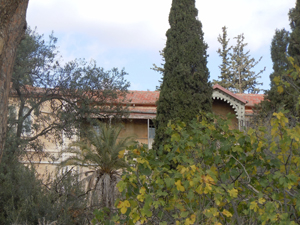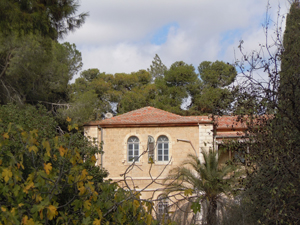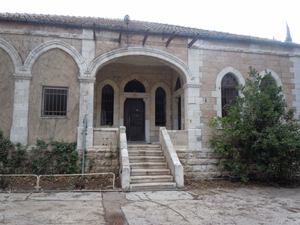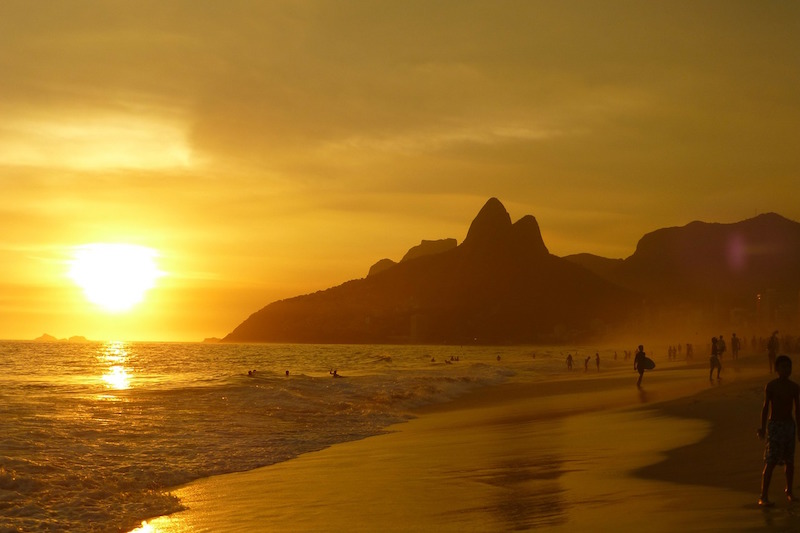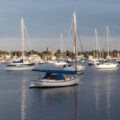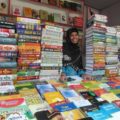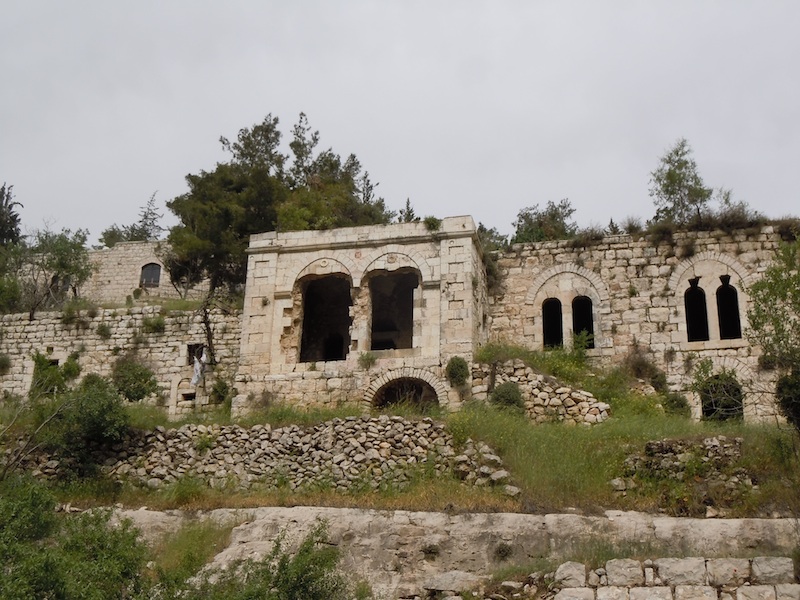
Claudiaexpat takes us on a tour through the expropriated houses in a part of Jerusalem, and explains why talking about home in Palestine is a very delicate issue.
Speaking of home in Palestine means to dig into a deep wound for entire generations of Palestinians who have been expelled from their homes. This is made even more painful by the fact that the tragic fate of the Palestinians has historically gone unnoticed and is not admitted or recognized even today, after more than sixty years.
Between 1947 and the end of 1948 about 800.000 Palestinians were expelled from their villages and towns (Ilan Pappe, The Ethnic Cleansing of Palestine, Preface xiii), and had to flee, in many cases precipitously, leaving their homes and all their things as they were when the attack came from the Zionist militias (Irgun, Stern Gang, Haganah, which later formed the backbone of the Israeli army).
Palestinian families whose homes, land and lives have been expropriated, took away with them the keys of their house, in the really sincere hope that they would return once things calmed down, or when the international community would finally decide to come to their rescue.
Today these keys are all that’s left to them, and many families keep them carefully. However, many of the houses that were expropriated no longer exist, because entire villages were razed to the ground; those that still exist have been allocated to the Jewish families that poured into the country after the Holocaust. The Palestinians have never received any kind of indemnity or compensation for their losses.
In Jerusalem, entire neighborhoods of beautiful Arab homes are now in the hands of Israeli families, who live there happily. I was lucky enough to join a walking tour led by a Palestinian woman whose family house was expropriated in what is now called Baqaa, and who showed us a good number of expropriated homes and told us their history.
The meeting point was at the Liberty Bell Park, behind the King David Hotel, known for the terrorist attack by the right-wing Zionist organization Irgun in July of 1946, that killed 91 people, when Palestine was still under the British mandate. We started our walk towards the Greek Colony, and the first building that Huda pointed out to us is this:
Located at the intersection of King George, King David and Jabotinsky, this building belongs to the Daoud brothers and it is the only construction that the Palestinian owners have managed to repossess by legal measures, after an administrative and bureaucratic ordeal that lasted fifty years, insisting on the fact that when the expropriation took place, they were traveling in South America, a country that was not at war with Israel. Today this building houses law firms and other Palestinian and Israeli professionals.
We take Jabotinsky and Huda begins to show us some typical elements of Palestinian homes of the time, like the columns on the balconies in this house:
She also explains that all these expropriated houses have been “signed” by their new owners with some changes, usually the addition of a raised roof covered with red tiles (very characteristic of the majority of houses, all invariably white, of illegal settlements built on occupied territory). For example this:
We arrive at the intersection of the Belgian consulate, built by a French architect, who was also in charge of the construction of the French Consulate in Jerusalem. The house that hosts it belonged to the Salameh family, whose father chose to donate it to the Belgian diplomatic corps, rather than see it brutally expropriated. Huda says that recently a member of the Salameh family, invited by one of the sons of the then Belgian consul, indicated a trap door that opened into an attic, where trunks were still crammed with family mementos, clothes and toys .
A few steps away from the Belgian consulate is the house of the Habash family, a prominent family in Palestine that founded the Commercial Press (which still operates in East Jerusalem). While Huda tells us the story, out of the house comes a man wearing a kippa (Jewish head covering). Huda asks him politely if he lives in that house, and since when. Thirty years, he says. And would he know to whom this house originally belonged ? To the Habash family, he replies evasively, before slipping away, while Huda thanks him for his honesty.
Huda says that on 15th May, Nakba Day (on 15th May 1948 the state of Israel was declared; Palestinians commemorate this day as the Day of Tragedy), Palestinians whose houses were expropriated, toured the neighbourhoods and stood next to their houses with a t-shirt that said “This is my house”. The octogenarian grandmother of the Habash family arrived in front of her house, jumped from the bus with astonishing agility, and went to sit under the pomegranate tree in the garden of what was once her home, flipping through the family photo album that showed children of her family playing around under that same tree.
We take left at the house of the Habash family and find ourselves in a street with houses of stunning beauty, although sometimes embellished with details obviously added by the current occupants, that strongly clash with their original elegance:
Here we run into Bsharat house, where Golda Meir lived for a time during her mandate. Huda points out a mosaic with inscriptions in Arabic that she had ordered to be removed (the central part is slightly faded compared to the blue of the mosaic).
The road ends at the Jerusalem Theatre, and here we turn left and we find an immense space that hides a seemingly abandoned house that nobody knows anything about. A menacing red and white sign in Hebrew is on the gate , but none of us understands what it says. Huda tells us that many homes are temporarily abandoned because they are not immediately allocated and in many cases they have passed under the management of some Israeli real estate agencies that are trying to sell them. Many Palestinians whose house was stolen have even tried to buy it back, sometimes with a nominee, maybe a foreign friend who pretended to be interested in exactly that house. Needless to say that even this does not work. Real estate agents are always very cautious in selling these properties, and perhaps especially when approached by strangers.
We are approaching the house of Huda’s father, as she tells us that some years ago she got to know by chance that it was undergoing renovation. She started peeping around the house, in an attempt to get hold of anything that the renovating works would bring out. She stubbornly managed to collect enough of the original floor tiles, evidently torn off the floor to make room for a more modern one, and so recreate a little of the atmosphere of her original home in her current place in Sheikh Jarrah.
We don’t get too close to her home in Baqaa, but watch it from afar while Huda explains that her father had built it exactly in this point to stay close to his mother, who lived up the street. When Huda shows us the grandmother’s house, I’m amazed: I pass in front of it almost every day. The street is busy, full of shops and bars, and the house is located right next to a parking space that I use often when I go to the post office or shopping, yet I never realized that within that enclosure there was a small compound with two twin houses of rare beauty, and a smaller house (at the time for domestic staff) on the back.
There are no problems entering the compound which is only partially fenced. There are no floors and original features, though for a while, recently, the two buildings were used as schools. Huda’s aunt, sister of her grandmother, returned a couple of years ago to see the house, and Huda is shaken by obvious emotion as she describes how the old lady tried to steal through the open windows, the largest amount of detail of the interior .
We step away and walk back towards the Liberty Bell Park. I try to imagine what it could mean to go through such an experience of brutal dispossession. I know that someone who has not gone through it can hardly even start feeling the weight of such pain and loss. My only hope is that by informing myself, by listening to people who have gone through it, and by writing this article, I will at least contribute in a minimal way not to let this tragedy go completely unheard.
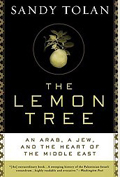 For those who read in English and are interested in the topic, there is a fairly interesting book that tells the story of a house in Ramla (today in Israel), that was given to a Jewish family coming from Bulgaria, while its Palestinian rightful owners had fled to Ramallah because of the repeated attacks to the village. The writer is an American journalist married to a Palestinian, and has interviewed extensively the two persons that became friends through the house: one is the then Palestinian child that left his home when he was six, and goes back to visit it when he is a young man; the other one is the lady that arrived in that house when she was one year old, and opened the door to the young Palestinian, thus discovering the true story of the house where she has always lived. The Lemon Tree, by Sandy Tolan, although written in a rather journalistic tone, manages to convey the depth of the sorrow of the dispossessed Palestinian family, and it is a quite complete document about what happened in this land at those times, and in more recent ones.
For those who read in English and are interested in the topic, there is a fairly interesting book that tells the story of a house in Ramla (today in Israel), that was given to a Jewish family coming from Bulgaria, while its Palestinian rightful owners had fled to Ramallah because of the repeated attacks to the village. The writer is an American journalist married to a Palestinian, and has interviewed extensively the two persons that became friends through the house: one is the then Palestinian child that left his home when he was six, and goes back to visit it when he is a young man; the other one is the lady that arrived in that house when she was one year old, and opened the door to the young Palestinian, thus discovering the true story of the house where she has always lived. The Lemon Tree, by Sandy Tolan, although written in a rather journalistic tone, manages to convey the depth of the sorrow of the dispossessed Palestinian family, and it is a quite complete document about what happened in this land at those times, and in more recent ones.
Claudia Landini (Claudiaexpat)
Jerusalem
March 2012

